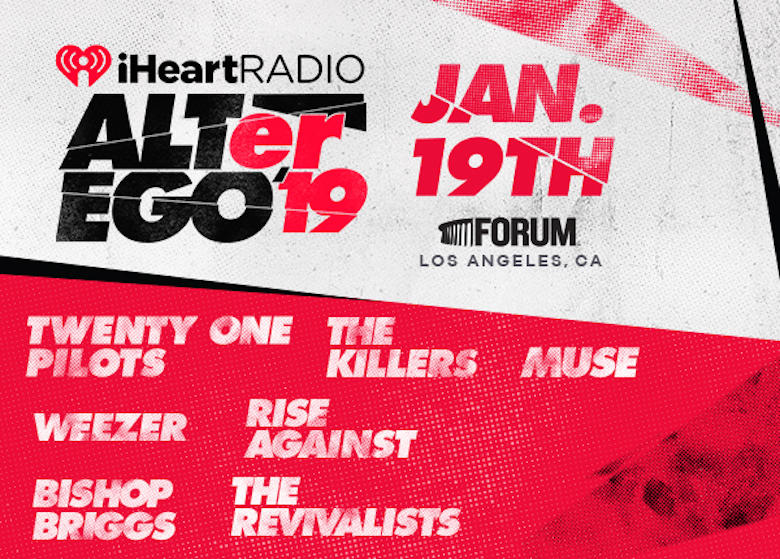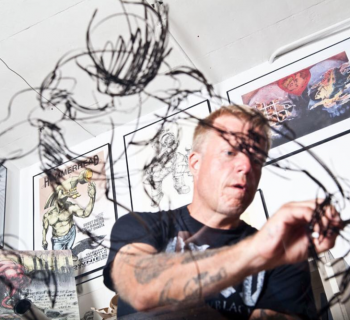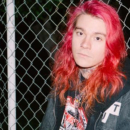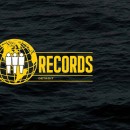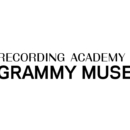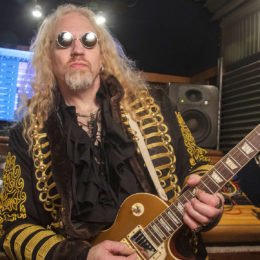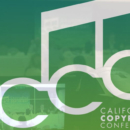Country singer-songwriter Eric Church isn’t keen on the much-overused tag “outlaw,” but sometimes the dusty trucker cap fits, so it’s best to grin and wear it. With a sound that evokes strong feelings and perhaps memories of long road trips through deserts, Church has long written music that could easily wind up on the soundtrack to a David Lynch or perhaps a Quentin Tarantino flick. And that’s all because his music is honest and emotive––sometimes heart-wrenching and sometimes hilarious. He’s a frankly magnificent songwriter.
This year, he released his sixth studio album, the typically staggering Desperate Man. After 13 years in the biz, he’s well into his stride, and it’s arguably time that he started getting more attention from outside of the confines of his own genre. We spoke to Church about all of this and so much more…
Music Connection: Let’s start with a little background. How old were you when you started, playing and singing, and writing?
Eric Church: I started singing at a younger age. I can remember being a kid, and I sang. I sang in church, I sang around my hometown, whether it be talent shows or whatever. I can remember my mom telling stories where, at four years old, I would stand up on a table in a restaurant and I would sing “Elvira,” the old Oak Ridge Boys song. So I’ve always sang.
As far as playing and taking it seriously, I really started in college. I went to a little school called Appalachian State University. It had a really good music scene––a bluegrass scene and a jam band scene. I formed a little band and started playing around. As we got more popular, my grades got pretty shitty. But we went from playing two days a week to four days a week, to almost every night if we wanted to. It became a job to me, playing around, and I loved it. That was the first time I thought, “This might be something I want to do.”
MC: When and how did you discover country music?
Church: I grew up in a small town, so country music was always around. At the same time, I’m a child of the ‘80s and what they call classic rock now was rock & roll then. I was listening to a bunch of different things. The influences that you see are what you can hear. My mom would listen to everything from George Jones to Waylon Jennings to Merle Haggard. She liked a lot of older stuff. My dad listened to Motown. Being a child of the ‘80s, I got into AC/DC’s Back in Black album, which changed my life. I have a big musical DNA footprint there.
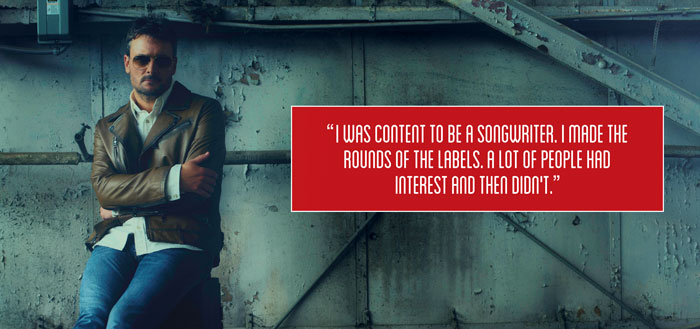 MC: Yes, you’ve said in the past that you’ve been influenced by metal bands. How do you think that surfaces in your own music?
MC: Yes, you’ve said in the past that you’ve been influenced by metal bands. How do you think that surfaces in your own music?
Church: I think there’s an angst there, a defiant nature, which comes out no matter how hard it rocks or not. The attitude with that kind of rock & roll is something that shows up. There’s a menace to it that I think shows up many times in our catalog.
It’s just a part of what I grew up on. It’s funny––when I started doing this thing, people were trying to ask if I’m more rock or country. For me, artists just write and sing about what they know and that’s what I grew up on. When I play something that sounded more rock & roll, it’s because that’s what I grew up listening to. For me, it’s really helped to have this broad base to build upon with all these different kinds of music. When I got into college, I got into bluegrass, Grateful Dead, Phish, some stuff that was out on the edges of what a lot of people listen to. It’s less of a stretch now because of the access we have to music in this day and time. It’s so easy to get. You can spend very little time finding pretty obscure and cool stuff.
MC: The Capitol Nashville deal happened pretty fast for you in 2005. How did that come about?
Church: I got to town in 2000 and really just wanted to write songs. I threw myself into songwriting. It’s the thing that everybody goes through––you think you’re a really good songwriter until you come to a place like Nashville, same as New York or LA. You think you’re good at what you do until you get around the pros. I had to learn really fast that I had a long way to go, so I started going to these writer’s nights where all these professional writers would go and play their songs. I would sit there for hours and just listen to them. I’d listen to how they crafted lyrics, their hooks, the chord structure. I was a sponge. I went to school and formed a band, and that was part of my musical education, but when I got to Nashville, just being there and listening to these people was another part of my musical education. I spent many, many hours doing that.
MC: How did you support yourself?
Church: I had to work some other jobs, but I was fortunate enough to get a songwriting deal with Sony Music, to write songs every day. I was getting paid to do it. But I was struggling to have success as a songwriter. Every time these artists would hear the songs, like “Sinners Like Me,” they would go, “That doesn’t seem like my song, it feels like his song.” It was really then that some labels started to hear it and wonder if I wanted to be an artist.
That’s when I really started thinking about it. Until then, I was content to be a songwriter. I made the rounds of the labels––a lot of people had interest and then didn’t. In the meantime, I got together with [producer] Jay Joyce. I went to Jay’s studio in his house, and we spent some time working on some songs. My initial reaction was that it was terrible. It was different, out there, and not what was visually in my mind. My brother was in town and I played it for him. His eyes lit up and he goes, “This is the shit.” What do I know? That ended up being the thing that got me the record deal, and I’m still working with Jay to this day.
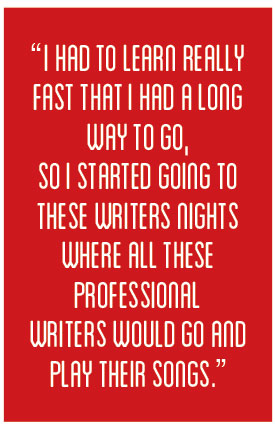 MC: They say Nashville is the place to be for a country musician because that’s where the business is, but it’s also so much harder because it’s where all the talent goes to be discovered––how do you stand out?
MC: They say Nashville is the place to be for a country musician because that’s where the business is, but it’s also so much harder because it’s where all the talent goes to be discovered––how do you stand out?
Church: I had the songs, and I had the will to go wherever I needed to go. It took Jay pushing me into an uncomfortable place. I was writing the stuff that I would pitch to George Strait, that’s where my songs were going. Then with Jay, we had this stuff that was out there. He put an alt-rock guitar solo in it, in the choruses, and it was so different and creative. It’s funny looking back now––that stuff’s not as wild anymore, but at the time it was wild. That was really what separated me sonically. Jay provided that. It’s been a fun ride. We just finished our sixth album.
MC: There have been 13 years between your debut album, Sinners Like Me, and this year’s Desperate Man––how have you evolved?
Church: I listen to Sinners Like Me now, and I sound like a kid, vocally. I hadn’t played shows, I hadn’t done any of the things that you do later where you learn. I think the evolution has been pretty gradual record to record. If you take the newest album and put it besides Sinners, it’s a pretty stark evolution. But if you go album to album, there was this subtle movement, both in content and in sound. I think that the greatest records mirror where the artist is in their lives at that time. That’s honest and authentic. Throughout this entire journey, you could take each of those albums and correlate it to where I was in my life: pre-marriage, post-marriage, playing bars and clubs, playing bigger places. Each record sounds like that time. That’s my favorite thing that we’ve been able to do.
MC: Three singles off that first album were hits––what do you put the instant success down to?
Church: It just sounded so different. At that time, there was a lot of female influence in radio. Now, we talk about the lack of females, but at that time you had Faith Hill, Martina McBride, Shania Twain, Reba––country radio then was not made for male listeners. Male listeners had moved to classic country and classic rock. That’s what they were listening to. Us coming out, we shook the element up a little bit. That’s the music I was making and the audience I was making it to. Our early shows, I can remember it being 80 percent male. You look out and there’s just males in the crowd. It’s changed over time. I think at that time, that was a very unique thing in country music.
MC: The Industry has changed beyond recognition in those 13 years, too––the way you put music out there, and the way you make money. How have you had to adapt?
Church: Oh shit, I don’t know that anything has changed more. When I signed my first contract, nobody had ever thought about streaming music. Nobody had ever come up with that. For us, technology has moved so fast. We went from albums to CDs, specifically at that time CDs being the main way people consumed music, and we focused on the first week of sales and distribution. You had all these music retailers. Three records later, the CD was going away, and we were all about iTunes and downloads. Two records later, all of that’s done and everybody is focused on streaming. It’s been an incredible thing.
At this point in time, from where we started to where we are, I don’t know that the music industry has changed more than any other era of music. Some people got in a little later and CDs were already gone, but we were able to see the full gamut of it. A physical retail market all the way to primarily a digital retail market. I think it’s been bizarre. Here’s what I’ve learned about that: It still comes down to the album. I think the biggest mistake young artists make, is they just put out a song, or they just put out an EP. I’ve said it many times––I love to read books. If you read books, you can’t just read one chapter or two chapters. You’ve got to read the whole book. That’s how you get a picture of who the author is and what the story’s about. That’s what separates us in my opinion, and allowed the success to happen.
We still make albums, and we focus on making albums front to back. Even the order. When I hand somebody Desperate Man, it has been designed to be heard start to finish. Whether you do it or not is up to you. I think that’s the reason we’ve had the success that we’ve had, and especially live. I think people have been able to latch onto songs that were not hits, but have become our biggest hits live. “These Boots” has become one of our biggest songs, “Sinners Like Me,” “Carolina”––none of these songs were singles, but if you come to a live show, they’re some of the biggest hits of the show.
With the last album, it had less surprises. It was more of an Americana based album to me. Stripped down. With this new one, were stretching our legs a little more, creatively. A little bit of the edges. That’s just fun for me.
MC: Where did you record and with whom?
Church: Jay Joyce––Jay’s done all my records. This is the sixth in a row that we’ve done together. Thirteen years ago we started out in his basement, and now he’s got a really big studio in a church in East Nashville. He bought an old church and turned it into a really cool studio.
We spent a fair amount of time on Desperate Man. I had a hard time figuring out what this one was supposed to be until about the middle of the process. When I started, I had this idea of where I thought the record was going to go. It was going to be this big, anthemic album, mirroring more of the highlights of Sinners Like Me, but I was bored. We did four or five songs and it was weird. The vibe was weird, and I just didn’t like it. I almost stopped in the middle of it and called time-out. But ironically, it was two songs: “The Snake” and “Hippy Radio” back-to-back, when I started to see the identity of this album come to life. And those are very different songs. I felt like they both lived on this record that I was trying to make but didn’t have it yet.
Then I started writing a lot, so a lot of that stuff we used in the studio, I would write on Wednesday and we would literally cut it on Thursday. This creative thing started to happen and, next thing I know, as hard as it was to make it, we had the record we were trying to make.
MC: Who is your manager right now, and who makes the big career decisions? Is it a team dynamic?
Church: It’s a team. John Peets is my manager, he’s with Q Prime in Nashville. We started out together at the very beginning. John’s always been very good at seeing the big picture. We’ve had times when we’ve been hot, times when we’re not, times when we were searching for our fanbase, our identity, all these things, and the entire time John has always seen 20 years down the line and we’ve made those decisions based on 20 years down the line. For example, Mr. Misunderstood––giving the album away and surprising fans. This time, we’re also giving the music away, trying to beat scalpers on the road.
These broad decisions end up valuing your fans first. Not the label, not radio, not press, but the fans. I think by doing that, and the decisions made to do that, it’s allowed us to have a special relationship with our fans. That’s down to John.
MC: You’re a vocal advocate of marijuana. Will Tennessee go the same way as Colorado and California?
Church: I think so, because it all comes down to money. Look at the money that Tennessee is losing out on. I look at it very much like alcohol back in the day. You used to have Prohibition, but once we figured out we could tax it we could make money off it. We just figured out what the rules needed to be. That’s probably where we’re headed with marijuana. I think in every state, we’ll start with medical, like Colorado did it, and move onto recreational pretty quickly from there. I’m sure there’ll be places in the south that’ll be the last to hold out, but I don’t foresee any of the 50 states holding out when they see the revenue that’s available.
Also, everybody’s so wound up over immigration, border crossings and drugs, but the easiest way to fix that drugs problem, at least as far as marijuana, is to legalize it. You take away the need for the supply. That to me goes across the board. I think it’s inevitable, I really do. There will be different moral obligations for people, but I think there’ll continue to be two or three states a year.
 MC: Of course, those views put you in a similar position to Willie Nelson, to whom you’ve been compared. Do you consider yourself an outlaw artist in the classic sense?
MC: Of course, those views put you in a similar position to Willie Nelson, to whom you’ve been compared. Do you consider yourself an outlaw artist in the classic sense?
Church: I don’t. I really don’t. I know that era and what that era was. I’ve said many times, that’s an era that’s been thrown on us a lot. I get it, in certain times in our career and certain things we’ve done, but for me we’ve just always done our own thing. I’ve never really looked at what was going on at that time in country music or in music. We’ve just done what we do, and we’ve not been afraid to do that and continue to do that. It’s weird for me. I have a lot of people use that title, but it’s not something I consider. In the traditional sense of the word, it’s not quite accurate.
MC: Tell us about the Chief Cares Fund that you started with your wife.
Church: It’s been one of the coolest things we’ve done. We thought about doing it a few times, but once we got to a certain level of success––we had some problems and I’m a big anti-scalper guy. I do anything I can to get tickets in the hands of our fans at the price that I want them there.
We had some fans come and say that they’re willing to pay a higher ticket price to be close to the stage and have that experience. We decided that we would do a premium or platinum Chief Cares ticket price. If you want that, near the stage, we’ll set aside a certain number, but all the money goes to Chief Cares. You can do that if that’s what you want, but we’ll make sure it funds a charity. We’ve been able to do a lot of good things with it. It’s Christian based, but also it’s small town individual-based too. I’m not a big, mass, broad spectrum charity guy. Some of these charities have so much overhead that you end up paying for administrative stuff and not helping people. So we try to focus on the mom and pops––who are the small charities that are helping people? It’s worldwide too, global.
MC: What’s next?
Church: We’ll start announcing the tour. That’s coming next year. With Mr. Misunderstood we played 30 plus shows, no opener, and an intermission. Just us all night. I want to keep that vibe. I’m just not sure how to do that yet because of how much music it’s going to be. Sometime next year, we’ll be saddling back up and taking the Desperate Man record on the road.
Contact Ebie McFarland, [email protected]

